You are awake. You think and you feel. But what is it that is doing all this thinking and feeling?

We call it “consciousness” and over 100 years ago the philosopher Edmund Husserl made a bold attempt to uncover its secrets.
Subjective experience is private
The thing is: Consciousness is not “out there”, it is “in here“. It is personal and subjective. When I say that I like squirrels or that my foot hurts, then you will have to take my word for it. You can’t know what it is like to be me, and I cannot know what it is like to be you. Consciousness can only be observed from the inside, not from the outside.

Since we can’t see the world through other peoples’ eyes, their experience remains deeply mysterious to us.
Thus we all see the world differently. And this can lead to bitter conflict.
Science is based on objective insight
One way to overcome such conflict is to take an objective position. We take a neutral view from outside and focus on the things that we can all agree upon. We have learned to see ourselves “from the outside”.

In fact, we can build a whole method to gain objective insights: Science. From a scientific perspective our subjective experience is irrelevant.

It does not matter what a particular temperature feels like for you, it only matters what we all can measure.
The problem of psychology
But if we want to create a science about the human mind, we run into trouble. As mentioned before, our subjective experience—our consciousness—can only be observed from inside.
This is a big problem for psychology. It is also why some people would not take psychology seriously as an objective science.

One solution to this problem is to just ignore subjective experiences and focus on what can be measured: brain waves, blood pressure, or the amount of saliva in the mouth of a dog.
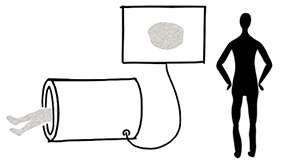
Another solution is to get indirect access to our experience through surveys. Simply ask a lot of people about how they feel on a scale of 1 to 10 and just like that, you get an “objective” number of their “happiness”.
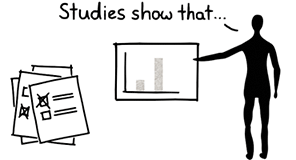
Studies like these might give us objective facts about the human mind. But they don’t reveal what it is like to be such a mind.
How to describe consciousness
This is where Edmund Husserl stepped in. He was convinced that a subjective philosophy—if done properly—can achieve what the natural sciences can’t: get direct access to consciousness.
This is his method:
1. Focus on acts of consciousness.
At the core of his philosophy are phenomena, or how things appear to us. Because this is what consciousness is: it is us being conscious of something. We dream of something, look at something or look forward to something.
For Husserl, consciousness is what relates to other things. And to understand it, we must understand how this relating works.
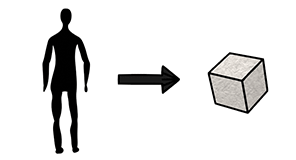
Here is the trick: For Husserl’s method we must ignore what we think, see, or feel. Instead we focus on how we think, see, or feel. So whether the table you see in front of you really exists or not doesn’t matter for now. We only focus on the fact that you perceive it and how you perceive it.
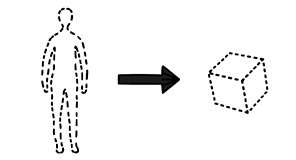
2. Observe from inside.
To examine our consciousness we have to take on a subjective perspective. Instead of looking at our head from the outside, we have to observe intuitively what is going on in our mind from the inside. We switch from objective to subjective view.
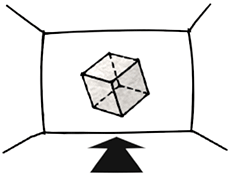
3. Describe what is essential about them.
Then we can describe these acts of our consciousness. But—and this is important!—Husserl says we should describe only what is universal or essential about them.
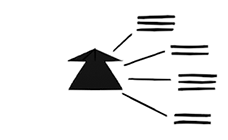
Let’s try this!
Suppose that we want to describe what it means to perceive an object.
When you look at that table in front of you then you will notice this: You can never see the whole thing at once! You can only look at it from one perspective at a time. You would have to move around the thing in order to perceive it completely.
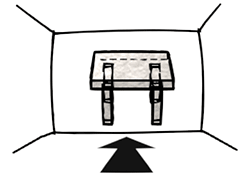
Yet even if you only see one view of the table at any given moment, this still implies the whole thing. So you don’t perceive just “one side of the table”—but the whole table.
Now, that must be true for all perception of spatial objects, and it is true for everyone. This “adumbration”, as Husserl calls it, is essential to the visual perception of physical objects. We perceive the whole thing even though we only see one side of it.

So here we go! We found an objective truth about perception, an act of our consciousness–just by intuition!
This is Husserl’s method: We start out with a first-person intuition of a conscious act, strip it off anything that is not essential, and hope to arrive at descriptions that should be objectively true for everyone.
A first science?
Since the aim of this method was to establish a science of conscious phenomena, Husserl called it phenomenology.

But… does that really work?
Intuition is a shaky ground to build on. No matter how thorough we are in our argumentation, we still can’t tell with absolute certainty whether these descriptions are true for all conscious beings. Just imagine a conscious being—an alien perhaps–that can look at something from all sides at the same time. Could we still say that perception of spatial objects only offers us one side at a time?
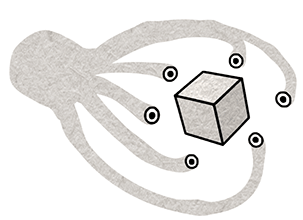
Or maybe it is all about words. What if our intuition about “perception” for example is simply based on how we have defined this word in the first place?

Husserl’s phenomenology has opened a door for many philosophers of the 20th century, like Martin Heidegger or Maurice Merleau-Ponty. Still, he might not have delivered the primary solid foundation for all science that he had hoped for.
A useful perspective
Then… why is this useful today? Husserl’s shift towards subjectivity shed light on something that had been notoriously neglected: How we experience the world from inside.

He encourages us to pay attention to our own subjective experience and learn how to describe it.
But there is another important lesson for us: Husserl loved Science.
And this is exactly why he also understood the limits of the scientific method. He warned us of the dangers of scientism, the erroneous belief that Natural Science can explain everything.
He pointed out that there are other methods besides Natural Science that can also provide us with insights about the world.
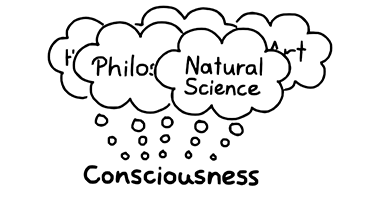
For him at the root of every such insight is our subjective experience. Even a science like psychology is based on this subjective experience, not the other way around.
If you want to dig deeper
- Inspired by Husserl, I have outlined a phenomenological description of what a picture is.
- Edmund Husserl, The Crisis of European Sciences
- Edmund Husserl, Ideas: General Introduction to Pure Phenomenology
- Edmund Husserl, Die Krisis der europäischen Wissenschaften (German)
- Edmund Husserl, Ideen zu einer reinen Phänomenologie (German)
- Russell Matheson, Husserl: A Guide for the Perplexed



1 comments On Edmund Husserl — Consciousness
Nice article!
I like the idea of an elevation (side view) showing the whole perspective. Although perhaps not directly related, it reminds me (or teaches me) of the drawings and objects of John Hejduk, I think he tried to give space (buildings) more faces, or characters, by designing the elevations very differently. Maybe he just played a little with the ideas of Husserl!